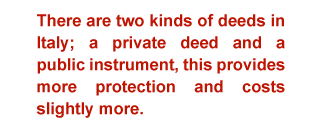|
||||||||||||||||||||||||
|
||||||||||||||||||||||||
Financing the Purchase of an Italian Property Arranging a mortgage to buy abroad used to be complicated but is becoming much less so now. It is never as easy getting a mortgage abroad as, for example, it is in Britain. Financing a house or appartment in  Italy
is better than, say, in the emerging property markets such as former eastern
bloc countries, but you will still find that you tend to require a larger
“caparra” (deposit) than in the UK. Italy
is better than, say, in the emerging property markets such as former eastern
bloc countries, but you will still find that you tend to require a larger
“caparra” (deposit) than in the UK.Up to the mid-1990’s, Italian banks rarely lent more than 50% of the value of a property, but this has now risen to 85% for buyers of a principle home. The maximum loan, however, for a second home is generally around 50 or 60%. Repayment periods for an Italian mortgage is usually up to 10 or 15 years, though some are now starting to offer longer terms such as 30 years. Italian mortgages are all of the repayment (capital and interest) method – there are no endowment or pension-related mortgages. Repayments are normally limited to about 30% of net income. Request further information There is also the issue of current exchange rates to take into account. If you take out a UK loan and your income is in Sterling, then you are less affected by currency rate changes as regards payments – but the risk of getting into a negative equity position is increased.  Mortgages
in Euroland also tend to be at a lower rate than in the UK. Mortgages
in Euroland also tend to be at a lower rate than in the UK.At this stage, you should also consider (and perhaps get professional advice on) aspects such as Capital Gains Tax (after five years in Italy a property is usually free of CGT but this does not mean that the UK government will be so generous – if you are not careful, both governments will be after money from you!). Inheritance tax is also an important consideration. |
||||||||||||||||||||||||
| Request further information | ||||||||||||||||||||||||
| The Legal Process Before you go too far with buying (and certainly before you make a deposit) there is work to be done. For one, check how many people own the property. In Italy, when parents die, the property is divided equally among their children. After a couple of generations, this can lead to many people owning the same house or plot. When you try to but it, all of them have to agree to the sale! Sometimes, many of these ‘owners’ have left Italy, often to live in America. The process of them all agreeing can take some time – and it just needs one of them say they don’t want to sell and it is all off.  Usually, one person takes the ‘lead’ within a family for the sale and helps to drive this process forward. It is important to gauge how confident they are that this will all go through. In addition, like Scotland, but unlike England, all of the searches etc have to be done before a deposit is paid. The deposit is paid when a Preliminary Contract is signed. This is a commitment to buy and is unlikely to be changed much (if at all) when the final contract is due. It is strongly recommended that you use a lawyer who understands the process and rules that need to be adhered to. The agent will be helpful and offer lots of advice - but remember, he is a salesman and is acting on the seller’s behalf – even though you too may be paying him a fee! Fortunately, legal support is not so expensive and is one of the smaller costs you will have to cover. It is thus even more good value for money. There are a number of Italian lawyers (both native speaking Italians and who also specialise in Italian legal matters) working out of the UK. Usually the agent can advise you on one to use as many other clients will have asked them in the past. It may seem to prejudice the impartiality of the lawyer if he is recommended by the agent, but in practice this does not happen and the lawyers are professional and work on your behalf. An Italian solicitor is responsible for drawing up your contracts, contacting the notary, paying any taxes and registering the property with the land registry (the “catasto”). This costs about 2% of the property’s cost, on average, although some lawyers will work for less. The solicitor will need to check for any proposed developments in the area, right of access cross the land etc. He should also check how many people are involved in the sale and that they have the legal right to sell. This can take some time in Italy as the number of vendors can be large. In summary the stages are:- |
||||||||||||||||||||||||
|
||||||||||||||||||||||||
| You should also be aware of other fees that may be due – such as the Notary’s fees, Registration tax, Council (“Comune”) tax and Capital Gains Tax (CGT) (if selling). | ||||||||||||||||||||||||
| Request further information | ||||||||||||||||||||||||
|
||||||||||||||||||||||||
| Home | Signup | Privacy Policy | ||||||||||||||||||||||||

